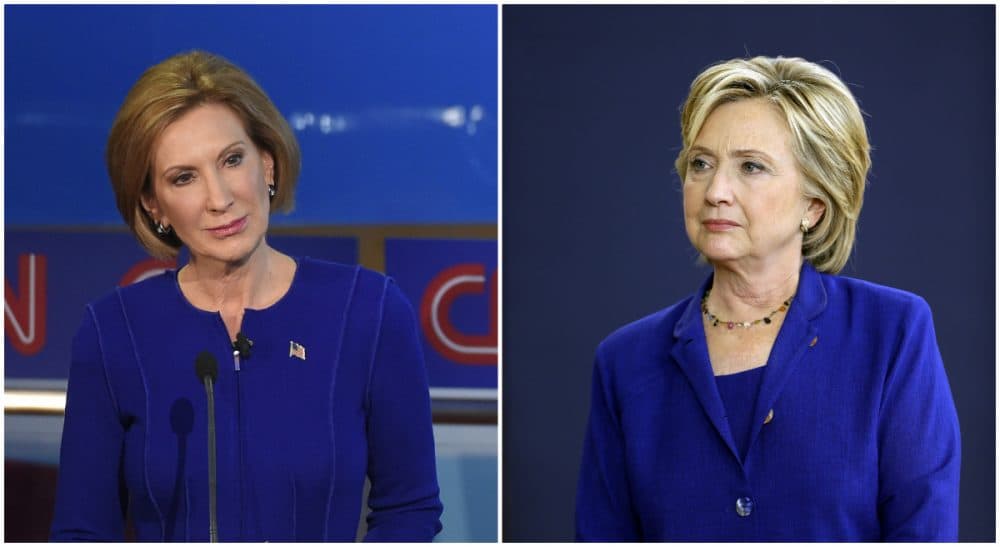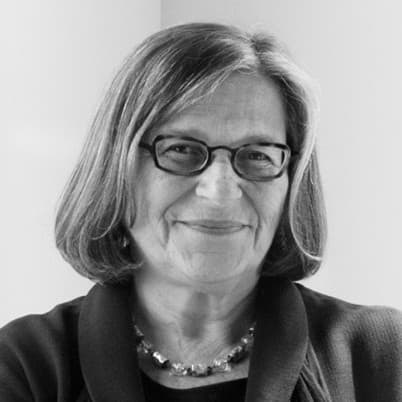Advertisement
Carly, Hillary And The Politics Of Gender

Lately, Republican party regulars have become starry-eyed over Carly Fiorina, the former CEO of Hewlett-Packard who elbowed her way into the main event for the presidential primary debate last week. Like the other two front-runners in the GOP pack, Fiorina doesn’t have a lick of electoral or policy experience that would qualify her to be president. Unlike Donald Trump and Ben Carson, however, she can appear rational, even dignified, on a public stage, and that’s been enough to raise her stature. In the land of the blind, to paraphrase the old saying, the one-eyed woman is queen.
More to the point, of course, Republicans see Fiorina as the one candidate who can neutralize the gender gap with the presumptive Democratic nominee, Hillary Clinton, and defend the Grand Old Patriarchy against charges it is indifferent, if not hostile, to women’s needs. Fiorina has taken to this role with gusto, telling crowds that if she is the Republican nominee, Clinton “won’t be able to talk about being the first woman president. She won’t be able to talk about a ‘war on women’ without being challenged. She won’t be able to play the gender card."
Fiorina is having a hard time squaring the gender circle. She wants the special attention of being a pioneer in a man’s game, but she also wants to be seen as an equal player...
Speaking at the National Federation of Republican Women convention earlier this month, Fiorina embraced her gender (and her age) in a rip-roaring retort to Trump’s insult about her appearance. “Ladies, look at this face. This is the face of a 61-year-old woman. I am proud of every year and every wrinkle.” Her campaign loved the line so much they made it into her latest social media ad.
And yet, Fiorina doesn’t want to see a woman on the $10 bill, dismissing the proposal as a “gesture." She argues that "women are not a special interest" and suggests that Democratic policies to support women in the workplace are patronizing. "I personally am so tired of hearing about women's issues," she said at that same event. "Every issue is a woman's issue."
Like other women seeking high office before her, Fiorina is having a hard time squaring the gender circle. She wants the special attention of being a pioneer in a man’s game, but she also wants to be seen as an equal player, up to par with male candidates and not very different after all. This tightrope act should be familiar to her from the business world, where ambitious women of her era once wore shirts with floppy ties and business suits and strove to be as calculating and aggressive as the men.
Over time, however, that attitude shifted to one that champions the distinctive voices and management styles of women — more collaborative and inclusive, perhaps, or at least more sensitive to women’s complex and overlapping societal roles. The groundbreaking 1982 study “In a Different Voice” by Harvard psychologist Carol Gilligan was the handbook for this approach.
In this respect, Fiorina is more old school than New Age. Many have noted that her positions on the issues place her at odds with what majorities of women say they want. She opposes increasing the minimum wage even though two-thirds of minimum wage workers are women. She opposes requiring businesses to offer maternity leave for new mothers, and she was against the Lily Ledbetter Paycheck Fairness Act, which gave women more rights to equal pay for equal work. She opposes the Affordable Care Act. She opposes abortion rights, wants to shut down Planned Parenthood and thinks businesses should be able to deny workers insurance policies that cover birth control, even though majorities of women in national polls disagree.
Clinton, too, has struggled to thread the needle of gender politics. Her vote to authorize the Iraq war was widely seen as an attempt to be tougher-than-thou on foreign policy...
Interestingly, Fiorina sees a new kind of feminism in this flinty self-reliance: Women are strong, capable and need no help from big government. In a manifesto she published in June, she defines a feminist as “a woman who lives the life she chooses.” She’d get little argument even from Hillary supporters on that, except that she is silent on how women without child care, health care, a decent education, a living wage or other social supports is supposed to exercise those choices.
Clinton, too, has struggled to thread the needle of gender politics. Her vote to authorize the Iraq war was widely seen as an attempt to be tougher-than-thou on foreign policy in advance of her 2008 campaign. Yet her signal accomplishment as first lady was relentlessly pushing CHIP, the Childrens’ Health Insurance Plan, and she endorses universal preschool, pay equity, free access to birth control and, famously, “the village” approach to social support for families.
Why should we want women in high public office? Is it just a matter of sheer equity — women make up 51 percent of the U.S. population, so they deserve to be more than 19 percent of the U.S. Congress? That’s a compelling argument on its face, and can be made for any other profession — doctors, lawyers, CEOs, journalists. Or is there something about women’s perspectives and life experiences that give rise to different issue priorities, and that in the political realm can lead to changes in the status quo, dominated for so long by men and their own concerns?
If that’s what we want from our women leaders, Carly Fiorina is a different face but the same old voice.
Renée Loth covers news, politics and architecture for Cognoscenti. Her column appears every two weeks.
